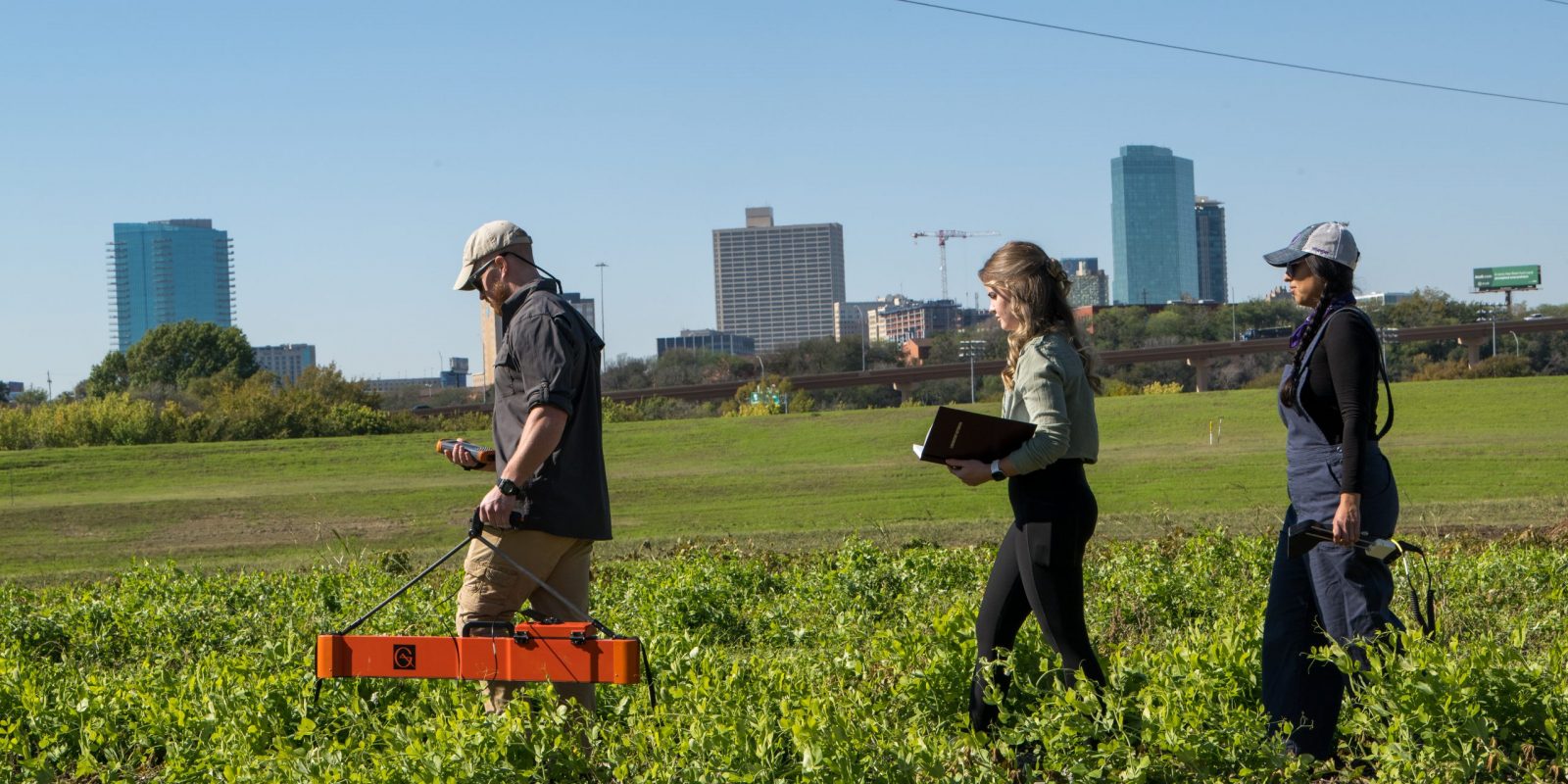
Graduate student Benjamin Strang, senior Brooke Newell and graduate student Ursula Nunez gather information at Opal's Farm in East Fort Worth. Photo by Leo Wesson
TCU Helps Sow Urban Agriculture in East Fort Worth
Professors and students partner with local nonprofits to bring healthy produce to an under–resourced community
Just east of downtown Fort Worth, on the bank of the Trinity River, fields of crops are flourishing under the Texas sun. The copious organic produce is a product of Opal’s Farm, founded by legendary Juneteenth activist and Nobel Prize nominee Opal Lee.
In the 2022 growing season, its fourth, the farm weathered severe heat to raise more than 5 tons of food on just 1 of its 5 acres.
Linda Fulmer ’89 MEd is a longtime east Fort Worth resident who a decade ago convened Fort Worth civic leaders for a conversation about health disparities among neighborhoods. Back then, “people were coming over here [to east Fort Worth] and talking to us about what to eat and how to cook it. But they didn’t seem to notice that we don’t have access to those ingredients here,” she said.
That meeting led to a search for ways to improve residents’ access to healthy foods. One idea in particular caught on: grow the food in the area.
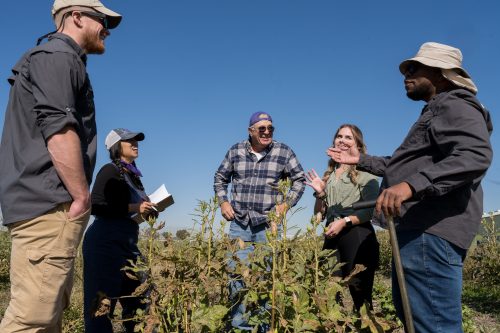
Professor Omar Harvey, right, and his research team of Benjamin Strong, Ursula Nunez and Brooke Newell worked with Gregory Joel, manager of Opal’s Farm, to help the urban farm grow vegetables in a food desert. Photo by Leo Wesson.
The result today includes Opal’s Farm, one of several farms to have sprouted in southeast Fort Worth in the last decade. The area encompasses neighborhoods that have suffered decades of disinvestment, including shunning by large grocery chains. Many residents are economically disadvantaged and face barriers to finding healthy sustenance. Residents without cars, for instance, have few options for reaching a full-service grocery store.
As the urban farm movement has taken root in the area, carrots and turnips now grow near a church. Collards catch the sun while kids toss a ball nearby. The southeast side is greening. And with a new federal grant, TCU is helping speed the process.
In 2022, three university professors helped land a three-year, nearly $400,000 Sustainable Agriculture Research and Education grant from the U.S. Department of Agriculture.
The collaboration unites nonprofit organizations and farmers with Omar Harvey, associate professor of geological sciences; Esayas Gebremichael, assistant professor of geological sciences; and Stacy Grau, professor of entrepreneurship and innovation practice at the Neeley School of Business. The effort aims to help the farms thrive and improve food security for city residents.
“Most of the problems that we face in the world, they don’t live in silos,” Grau said. “Anything that is going to be tough to solve, you’re going to have to look at it with a multidisciplinary or interdisciplinary lens in order to really solve it.”
A Food Revolution
The poverty rate in 76105, the ZIP code of one partner farm, exceeds 35 percent — more than triple Tarrant County’s rate of 10.9 percent. Health outcomes, too, are troubling.
Nearly 1 in 5 adults in that ZIP code has diabetes. Fewer than half have health insurance, and few elderly residents receive recommended preventive care. Life expectancy is 70.3 years, far fewer than Tarrant County’s overall average of 78.7 years.
Supermarkets in the area often close or avoid opening in the first place. That contributes to food deserts, which in turn affects health and basic quality of life.
Southeast Fort Worth’s nearly 35 square miles contain only two grocery stores. Work schedules and transportation options may not permit a trip to a distant grocery store. Instead, residents often rely on fast food or corner-store fare.
“If a person’s primary source of transportation is their own two feet,” Fulmer said, “then they’re not going to be able to drive 5, 6 miles away to get to the supermarket.”
Urban farming has powerful potential, and not merely to feed residents. Farming creates jobs and can help strengthen social ties among neighbors. Crops, orchards and greenhouses put vacant lots to use. Adding compost to soils can keep food waste out of the landfill, conserve water and pull carbon from the atmosphere.
“I tell people all the time: Building a garden is probably the most revolutionary thing you can do.”
Gregory Joel, manager of Opal's Farm
By Harvey’s back-of-the-envelope calculation, farming a thousand acres could allow Fort Worth to raise up to 10 percent of the fresh vegetables its residents need. Applying an annual 2-inch layer of compost to those acres could divert 200 tons of food waste from the landfill, save enough water to supply 30,000 homes and sequester 120,000 tons of carbon dioxide.
All that green space could also cool the city enough to save it 10 percent on summer energy bills.
Starting an urban farm means navigating financial and bureaucratic challenges such as finding vacant land, obtaining city permits, buying fencing and sheds, and drilling wells for water. Urban soils can be unpredictable and soil amendments costly. Finding a market for vegetables can be a challenge, while the optimal price — affordable to customers, sufficient for the farm enterprise — may not be clear. And most people who want to farm in the city must learn as they go.
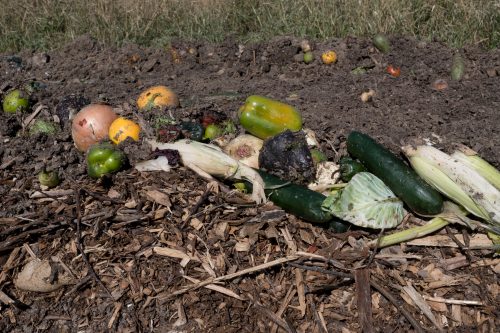
Among the items that are composted to enrich the soil at Opal’s Farm are expired vegetables. Photo by Leo Wesson
The TCU partnership aims to address all of these challenges. The grant will allow the faculty members to study and test inexpensive soil amendments, use remote sensing to monitor crop growth and figure out how best to sell or donate produce to residents. The faculty will also evaluate possible new farm sites.
Partner farms include Opal’s Farm, Tabor Farms and Mind Your Garden Urban Farm, all in the city’s southeast side. Nonprofit community partners include the social-impact organization CoAct, the Healthy Tarrant County Collaboration (Fulmer is its executive director) and the office of County Commissioner Roy Charles Brooks. The organizations will run outreach and training events with community members, network with food banks and help farmers navigate regulations and obstacles.
“We look at farming as an entrepreneurship endeavor,” said Jesse Herrera, founder and executive director of CoAct. “How can we empower community members with the skill sets and the capacities to be able to own and operate their own urban farms, and … [make] it as easy as possible to be able to get over those hurdles?”
“Our long-term goal is to really change the food system here in Fort Worth,” said Gregory Joel, manager of Opal’s Farm, “and be less reliant on these big grocery stores that most of the time move out of the neighborhoods that we serve.
“I tell people all the time: Building a garden is probably the most revolutionary thing you can do.”
Human-Centered Design
Aspiring urban farmers need land, for starters, but finding it is easier said than done. To help, Harvey and his collaborators plan to create an interactive map. Using county property records, soil data and information about local regulations and costs, the researchers will rank vacant lots based on their promise as potential farm sites.
“These three farms are just a pilot,” Harvey said. “We want to look at the full capacity of urban ag in the city.”
Urban soils are often mixed with construction fill, low in organic matter or contaminated with lead or other toxins. On a small city plot, soils should be as rich and healthy as possible.
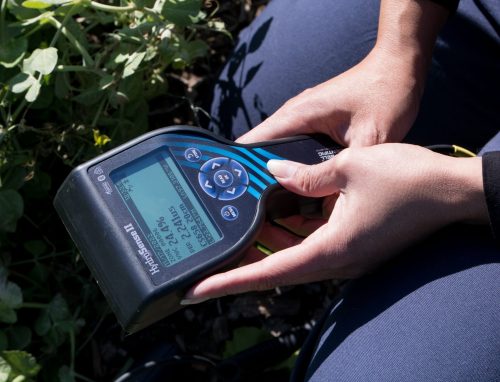
Soil tests will help tell farmers how much water is needed and if they need to enrich the soil with compost. Photo by Leo Wesson.
The geology experts on the grant team will use drones to explore land elevation, soil drainage and sun exposure, while farmers will learn to deploy the drones to monitor plant growth. Harvey and his students will study how adding compost affects an experimental tomato crop.
They’ll analyze soil health as they go, testing its acidity and levels of nitrate and phosphorus and carbon content. (Harvey has long entwined teaching and community outreach; his students have sampled soils at area farms since 2017.)
Drone and soil test data will allow farmers to apply the right amount of water or enrich with compost only where it’s needed.
“Rather than taking a blanket approach, it’s a precision-management approach,” Harvey said. “We’re doing this by training the students, training the farmers, and the farmers will train each other. When we are gone, the knowledge is still there.”
Grau and her students will gather data at farmers markets and work with farmers to better understand customers and business models.
“The people who are living in an under-resourced community, living in a food desert, what do they need? What are the main issues that they are struggling with?” she said. “It’s not as simple as, ‘Hey, we need more tomatoes.’ We want to use design thinking to understand what their needs are, what their pain points are, what their challenges are, what they like.”
As for farms, Grau said they’ll consider: “Is it better to be for-profit or not-for-profit? What do they need to sell, and at what kind of price?”
Design thinking, also known as human-centered design, is a flexible framework for solving tough problems. The process starts with exploration: looking past personal experience, setting aside preconceived notions and listening to people affected by the problem. Next comes brainstorming, then testing potential solutions.
Early on, this process can turn up key information. For example, any vegetable grown in the city may seem like a win. But Grau has learned urban farms often grow produce that isn’t much use to community members. They either don’t know how to eat it or cook with it, or it isn’t culturally relevant.
“Instead of going in with a very prescribed methodology, we want to just try some things and see where it leads us,” she said. “That’s the point of design thinking: You let things take shape based on what people are telling you.”
“I would like to see a time when people would come from other parts of Fort Worth and Tarrant County to east Fort Worth to shop.”
East Fort Worth resident Linda Fulmer '89 MEd
Food Destination
Efforts to address food insecurity, Herrera said, mean being intentional about understanding the community: “You have to understand who they are and what their day-to-day experiences look like.”
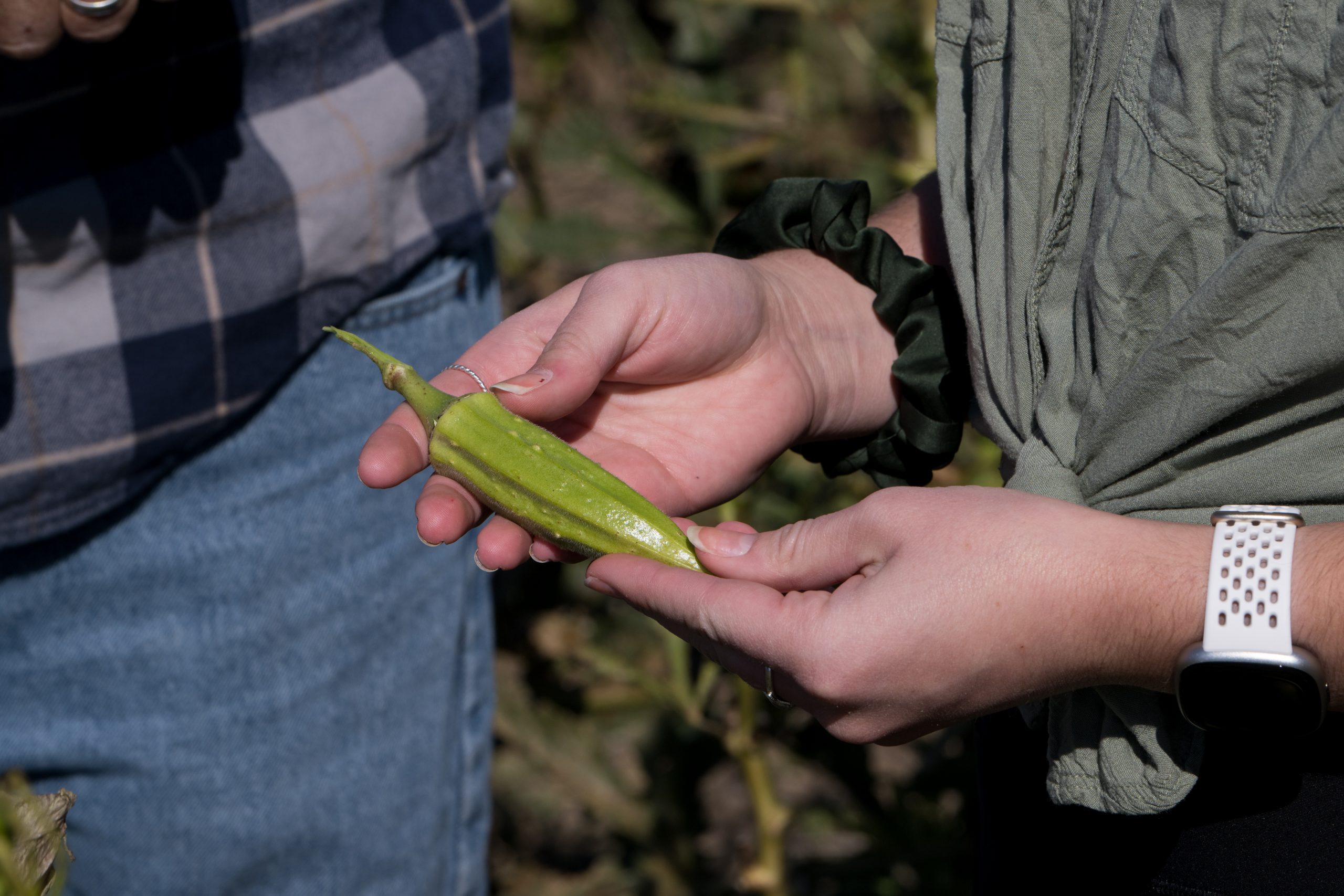
The fruit (or vegetable) of the farming at Opal’s Farm. Photo by Leo Wesson
Take a community member with a two-hour bus commute to work, Herrera said. “It’s a big contributing factor into what decisions I have available when I get off work, when I go to grocery shop. Stores may not be open, or the bus route may not have a direct route to that grocery store.”
Moreover, he said, Fort Worth’s two main farmers markets are not served by direct bus routes.
For Steven Nuñez, a Fort Worth native who co-founded Mind Your Garden Urban Farm, learning about healthy food is foundational. “How do you identify it? How do you cook it? What nutrients does it provide?
“My family, we’re of Mexican descent, so we’re very used to our cultural dishes — our enchiladas, our mole, our posole,” he said. “How do you then make those same delicious dishes plant-based? That’s [where] we focus a lot of our cooking demonstrations and outreach.”
What might successful change look like on a grand scale for the neighborhood?
Farmers can’t compete with developers for scarce urban land based on how much food their farms produce, Harvey said. Instead, “you compete by talking about all the ecosystem benefits, [including] green spaces in cities, having to produce your own local food, the capacity-building of your people so that they can be self-sustaining, those kinds of things. Those are the real values.”
Fulmer has lived in east Fort Worth since 1980, and she can picture this area becoming a food destination.
“I would like to see a time when people would come from other parts of Fort Worth and Tarrant County to east Fort Worth to shop,” she said, “because they know that they can get locally grown food that’s going to be healthy, that’s going to be grown using organic methods and is going to be delicious.”
Herrera concurred: “We can grow certain varieties of tomatoes here locally that you would never get in the supermarket, because they wouldn’t survive the trip.”
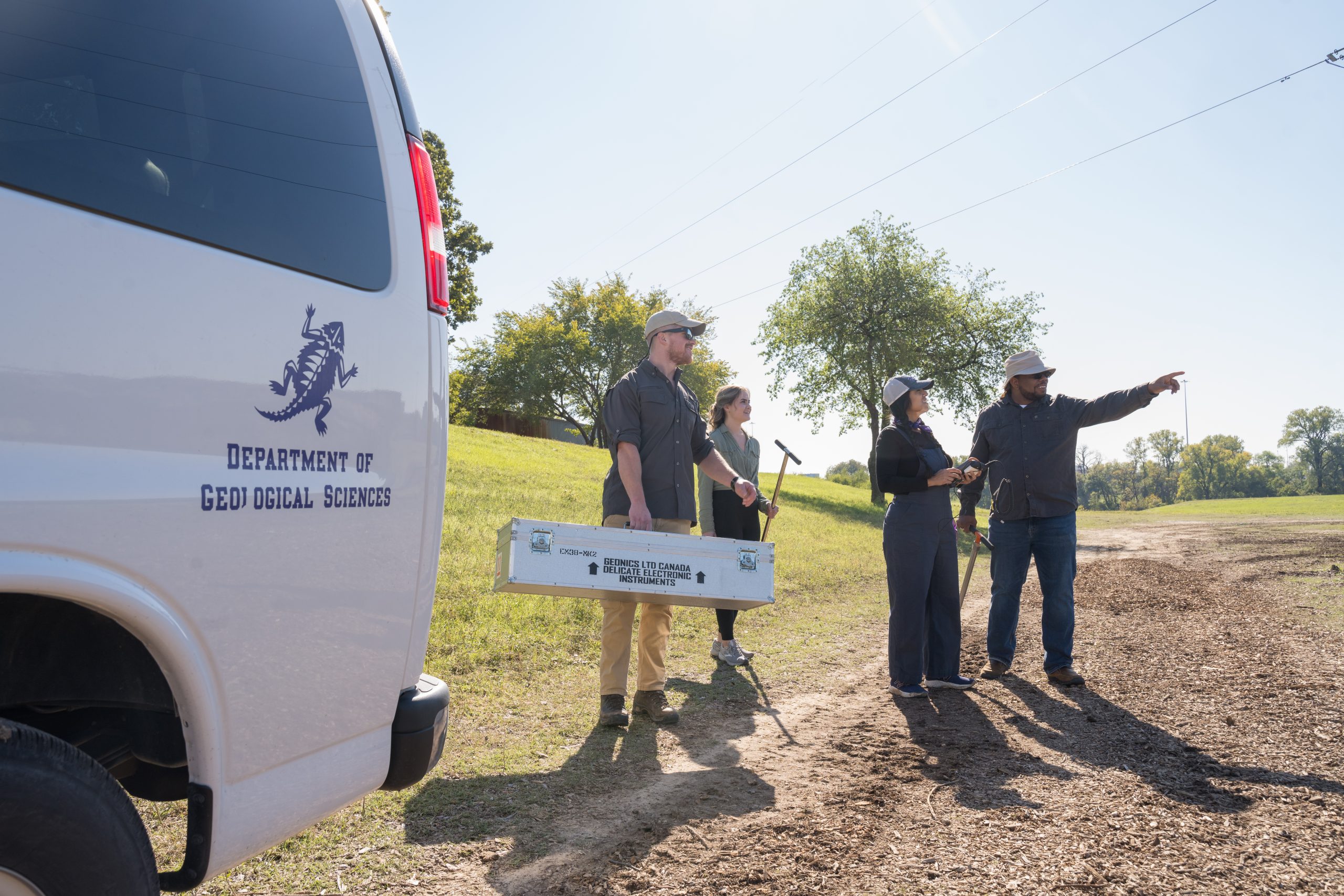
From left: Graduate student Benjamin Strang, undergraduate senior Brooke Newell, graduate student Ursula Nunez and professor Omar Harvey prepare to take samples and collect data on the soil at Opal’s Farm, an urban farm in Fort Worth. Photo by Leo Wesson

Your comments are welcome
Comments
Related Reading:
Features
Making Their Case
From confidence to courtroom skills, TCU Mock Trial is shaping futures one case at a time.
Features
As TCU Provost, Floyd Wormley Jr. Leads with Heart, Humor and Hard-Won Wisdom
The academic leader brings clarity, conviction and a scientist’s curiosity shaped by years spent balancing lab work, mentoring and a growing call to serve in higher education.